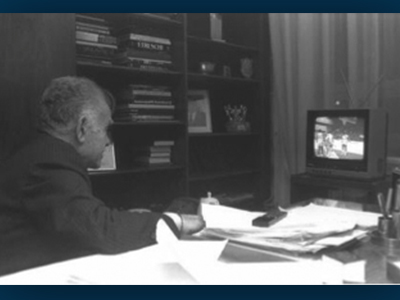Historic Basketball Game Takes Place in Moscow

January 12, 1989
Maccabi Tel Aviv defeats the CSKA Red Army team 97-92 in a basketball game held in Moscow. The game is the first in which Israeli athletes compete in the Soviet Union since the U.S.S.R. broke off relations with Israel after the June 1967 Six-Day War. Between the 1967 cessation of diplomatic relations and the Jan. 12 game, sporting events between teams from the two countries were held in neutral territory.
During 1987 and 1988, relations between the nations began to improve under the Soviet leadership of Mikhail Gorbachev. Two years before this historic game, in 1987, the two countries established consular ties, which coincided with the Soviet Union’s easing of restrictions on Jewish life and opening the gates of immigration to Israel. Two other events, a failed Soviet hijacking, in which Israeli authorities turned the perpetrators over to the Soviet Union after they attempted to land in Israel, and the December 7, 1988, Armenian earthquake, after which Israel sent relief workers, helped to make the game possible. The visas for the Maccabi coaches and players were issued only three days before the game.
While almost 200 Israeli fans of Maccabi were granted visas at the last minute and allowed to attend the game, the crowd is made up of many Soviet Jews, who chant, “Am Yisrael chai” (“The people of Israel lives”) and “Hevenu shalom aleichem” (“We bring you peace”). One fan, 25-year-old Arkan Karabchiyevsky, who is awaiting permission to emigrate and settle in Israel, tells The New York Times how the game is symbolic of the changing attitudes of the Soviet Union toward its Jews: “As a consequence, people of Jewish nationality are not as afraid. They can go openly to a game like this and express their feelings.”
The resumption of full diplomatic ties between Israel and the Soviet Union takes place Oct. 18, 1991, in advance of the Middle East peace conference that opens in Madrid at the end of that month.